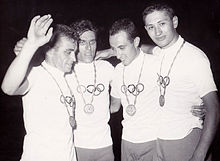
Édouard Louis Joseph, Baron Merckx, known as Eddy Merckx, is a Belgian former professional road and track cyclist racer who is the most successful rider in the history of competitive cycling. His victories include an unequalled eleven Grand Tours, all five Monuments, setting the hour record, three World Championships, every major one-day race other than Paris–Tours, and extensive victories on the track.

The Giro d'Italia, also known simply as the Giro, is an annual multiple-stage bicycle race primarily held in Italy, while also starting in, or passing through, other countries. The first race was organized in 1909 to increase sales of the newspaper La Gazzetta dello Sport, and the race is still run by a subsidiary of that paper's owner. The race has been held annually since its first edition in 1909, except during the two world wars. As the Giro gained prominence and popularity, the race was lengthened, and the peloton expanded from primarily Italian participation to riders from all over the world. The Giro is a UCI World Tour event, which means that the teams that compete in the race are mostly UCI WorldTeams, with some additional teams invited as 'wild cards'.

Felice Gimondi was an Italian professional racing cyclist. With his 1968 victory at the Vuelta a España, only three years after becoming a professional cyclist, Gimondi, nicknamed "The Phoenix", was the second cyclist to win all three Grand Tours of road cycling: Tour de France, Giro d'Italia, and Vuelta a España (1968). He is one of only seven cyclists to have done so.

Axel Eddy Lucien Jonkheer Merckx is a Belgian former professional road bicycle racer and the son of five-time Tour de France champion Eddy Merckx. He is team director of UCI Continental team Hagens Berman Jayco.

Roger De Vlaeminck is a Belgian former professional racing cyclist. He was described by Rik Van Looy as "The most talented and the only real classics rider of his generation". Nicknamed "The Gypsy" because he was born into a family of traveling clothiers, he is known for exploits in the cobbled classic Paris–Roubaix race, but his performances in other "Monument" races gave him a record that few can match. His record in Paris–Roubaix earned him another nickname, "Monsieur Paris–Roubaix".
The 7-Eleven Cycling Team, later the Motorola Cycling Team, was a professional cycling team founded in the U.S. in 1981 by Jim Ochowicz, a former U.S. Olympic cyclist. The team lasted 16 years, under the sponsorship of 7-Eleven through 1990 and then Motorola from 1990 through 1996. From 1989 to 1996 it rode on Eddy Merckx bikes.
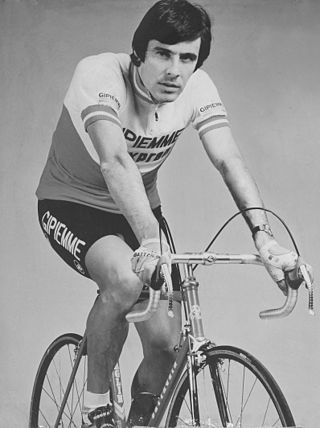
Giovanni Battaglin is an Italian professional road racing cyclist. The highlight of his career was his overall win in the 1981 Giro d'Italia. He also won the 1981 Vuelta a España.

Gösta Artur Roland Pettersson is a retired Swedish cyclist. As an amateur, he competed in the individual and team road events at the 1960, 1964 and 1968 Olympics and won one silver and two bronze medals, in 1964 and 1968. In 1968 he also took part in two track events: individual and team 4000 m pursuit.

Vittorio Adorni was an Italian professional road racing cyclist.
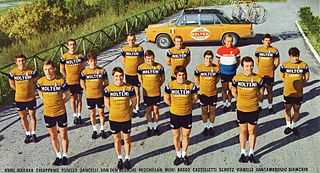
Molteni was an Italian professional road bicycle racing team from 1958 until the end of 1976. It won 663 races, many of them earned by its most famous rider, Eddy Merckx. Other riders included Gianni Motta and Marino Basso, who contributed 48 and 34 wins respectively. The Molteni family continues in cycling with sponsorship of Salmilano.
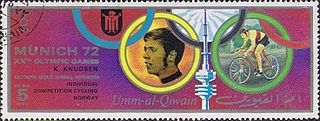
Knut Knudsen is a retired Norwegian road and track cyclist. As an amateur, he placed fifth in the 4000m individual pursuit at the 1968 Olympics before becoming Olympic champion in the same discipline in 1972. He would follow this up with another gold at the 1973 World Championships. At the 1972 Olympics he also placed fifth in the 100 km team time trial on the road. He won the Norwegian National Road Race Championships in 1972 and 1973.

The 1972 Giro d'Italia was the 55th running of the Giro, one of cycling's Grand Tours. It started in Venice on 21 May, with a 5.2 km (3.2 mi) prologue and concluded with a 197 km (122 mi) mass-start stage, on 11 June. A total of 100 riders from ten teams entered the 20-stage race, that was won by Belgian Eddy Merckx of the Molteni team. The second and third places were taken by Spaniards José Manuel Fuente and Francisco Galdós, respectively.
The 1969 Giro d'Italia was the 52nd edition of the Giro d'Italia, one of cycling's Grand Tours. The 3,851-kilometre (2,393 mi) race consisted of 23 stages, one of which was a split stage, starting in Garda on 16 May and finishing Milan on 8 June. There were two time trial stages and a single rest day. Felice Gimondi of the Salvarani team won the overall general classification, his second victory. Italians Claudio Michelotto placed second, 3 min and 35 s slower than Gimondi, and Italo Zilioli (Filotex) was third, over four minutes behind Gimondi.
The 1971 Giro d'Italia was the 55th edition of the Giro, one of cycling's Grand Tours. The 3,567-kilometre (2,216 mi) race consisted of 20 stages and an opening prologue, starting in Lecce on 20 May and finishing at the Vigorelli velodrome in Milan on 10 June. There were three time trial stages and a single rest day. Gösta Pettersson of the Ferretti team won the overall general classification, becoming the first Swedish rider to win a Grand Tour. Herman Van Springel (Molteni) placed second, 2 min and 32 s in arrears, and Ugo Colombo (Filotex) was third, just three seconds slower than Van Springel.
The 1974 Giro d'Italia was the 57th running of the Giro, one of cycling's Grand Tours. It started in Vatican City, on 16 May, with a 164 km (102 mi) stage and concluded in Milan, on 8 June, with 257 km (160 mi) leg. A total of 140 riders from fourteen teams entered the 22-stage race, that was won by Belgian Eddy Merckx of the Molteni team. The second and third places were taken by Italians Gianbattista Baronchelli (Scic) and Felice Gimondi (Bianchi), respectively.
The 1973 Giro d'Italia was the 56th running of the Giro, one of cycling's Grand Tours. It started in Verviers, Belgium, on 18 May, with a 5.2 km (3.2 mi) prologue and concluded with a 197 km (122 mi) mass-start stage, on 9 June. A total of 140 riders from fourteen teams entered the 20-stage race, that was won by Belgian Eddy Merckx of the Molteni team. The second and third places were taken by Italians Felice Gimondi and Giovanni Battaglin, respectively.
The 1968 Giro d'Italia was the 51st running of the Giro d'Italia, one of cycling's Grand Tour races. The Giro started in Campione d'Italia, on 20 May, with a 5.7 km (3.5 mi) stage and concluded in Naples, on 11 June, with a 235 km (146.0 mi) mass-start stage. A total of 130 riders from 13 teams entered the 22-stage race, which was won by Belgian Eddy Merckx of the Faema team. The second and third places were taken by Italians Vittorio Adorni and Felice Gimondi, respectively.

Ole Ritter is a former Danish racing cyclist, mainly known for breaking the hour record in 1968.
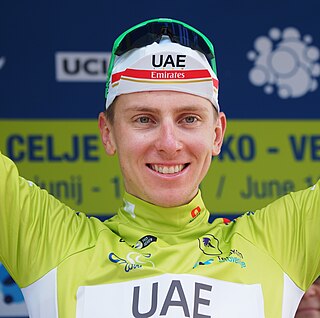
Tadej Pogačar is a Slovenian professional cyclist who currently rides for UCI WorldTeam UAE Team Emirates. His victories include three Tours de France, the 2024 Giro d'Italia, and seven one-day Monuments, as well as the World Championship Road Race. Comfortable in time-trialing, one-day classic riding and grand-tour climbing, he has been compared to legendary all-round cyclists such as Eddy Merckx and Bernard Hinault as one of the sport's greatest. In 2024 he became only the third male cyclist, after Eddy Merckx in 1974 and Stephen Roche in 1987, to achieve the Triple Crown of Cycling, winning the Giro, the Tour, and the World Championships in the same year. He is the only rider in history who took the Triple Crown and two different monuments in the same year.
